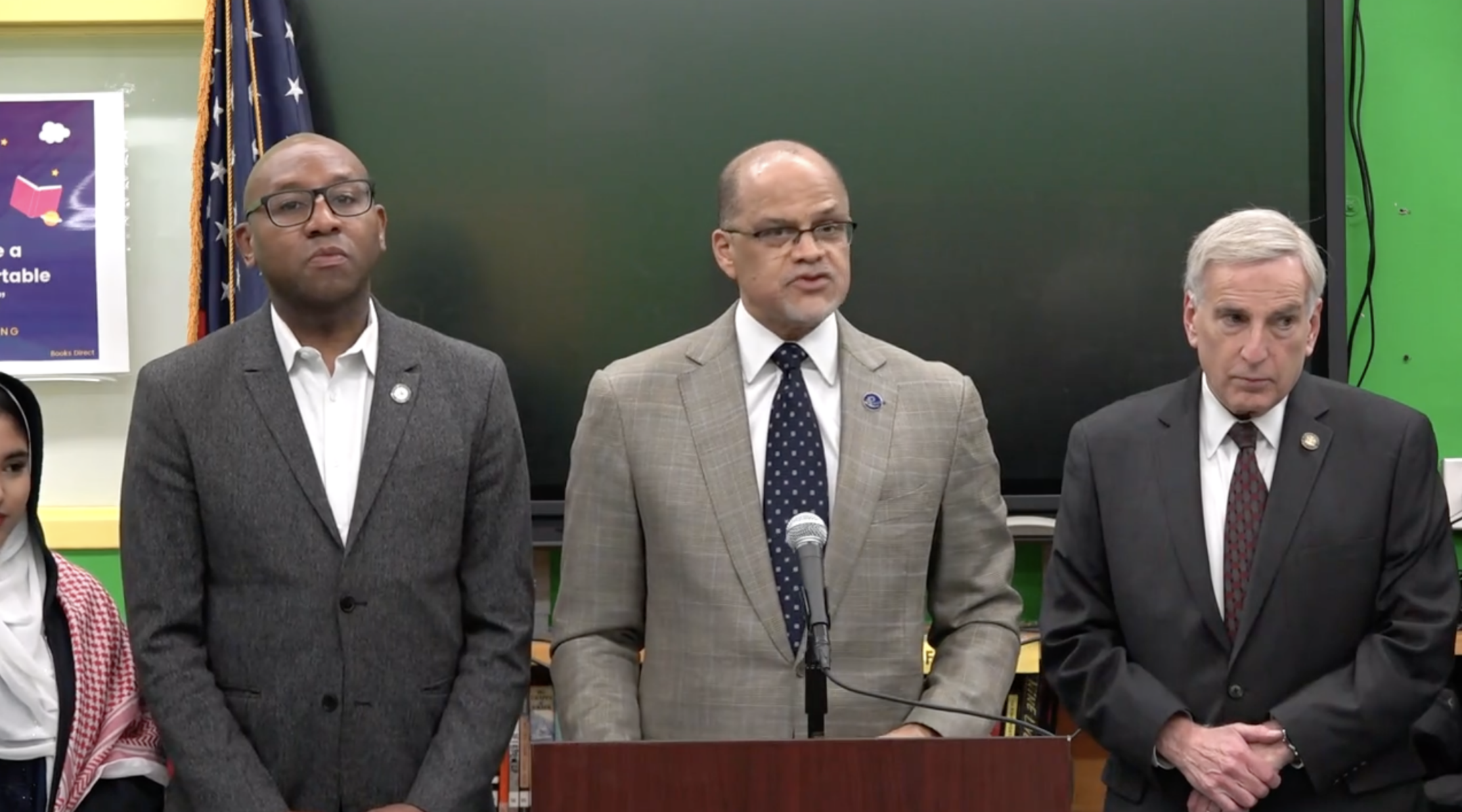(New York Jewish Week) — The chancellor of New York City’s public school system unveiled a plan to combat antisemitism and Islamophobia, after coming under pressure from Jewish advocates, faculty and students to make reforms.
Chancellor David Banks announced measures including training for faculty, clearer disciplinary guidelines and engagement with faith communities to stem hate in schools.
“We will not solve the crisis in the Middle East, nor the many crises around the world that impact those in our schools, but we can and must live and work and learn together with respect,” Banks said at a briefing on Monday attended by Jewish community leaders.
On Monday, the department said it would be “prioritizing investigations into antisemitism and Islamophobia allegations through our Office of Equal Opportunity.”
The announcement came following several reported antisemitic acts by students in the wake of the outbreak of the Israel-Hamas war. Students targeted a Jewish teacher in a riot at Hillcrest High School in Queens, and an anti-Israel student walkout in November saw teens shouting antisemitic epithets. There has also been swastika graffiti in schools, some of it predating Hamas’ Oct. 7 attack on Israel.
Hard data on antisemitic incidents at New York City public schools is not available, but antisemitism has spiked in the city since Oct. 7, according to NYPD figures, and educators and activists have said the trend has also manifested in schools.
The federal government has also taken notice: On Nov. 30, the Department of Education’s civil rights office announced that it would investigate New York City public schools over allegations of antisemitism and Islamophobia — a step it has generally reserved for college campuses but which it has applied to a number of public school districts since Oct. 7. Plans to address antisemitism are generally key to resolving such investigations.
Banks acknowledged that members of the school community had been feeling unsafe, “both physically and emotionally.”
“I hear you. I’m taking this very seriously. Hate and harassment of any kind are unacceptable and will not be tolerated in our schools,” Banks said.
Moving forward, all middle and high school principals will participate in professional development training focused on “navigating difficult conversations” this spring. The school leaders will then relay the training to other staff. Parent leaders will be offered anti-discrimination workshops starting next month.
The school system will also add to its instructional resources on antisemitism and Islamophobia as well as diversity training. Banks said he viewed education as a long-term solution to discrimination in schools.
He said students would be directed to reliable and objective sources of information about the Israel-Gaza conflict. After the incident at Hillcrest, during a briefing at the school, Banks said he believed social media played a central role in stoking the unrest.
“We cannot leave it to social media to educate our children,” Banks said on Monday.
He also said educators must “leave our personal viewpoints at home.” Jewish activists, including the NYC Public Schools Alliance, a recently-formed Jewish advocacy group that includes public school staff, have condemned teachers for endorsing Palestinian narratives both inside and outside the classroom. In one recent incident, a school’s map of the Middle East was found to have omitted Israel, referring to the area solely as Palestine. “Our job is to educate, not to indoctrinate,” Banks said.
Principals will also receive training on disciplining bias incidents with “direct consequences” aimed at reforming behavior.
If the person reporting antisemitism feels the principal has not adequately addressed the incident, Banks outlined alternate ways to report antisemitism directly to his department.
The school system developed the guidelines with input from faith leaders, including New York’s UJA-Federation and Jewish Community Relations Council. The schools will aim to maintain their engagement with faith communities, Banks said.
He highlighted the incident at Hillcrest, from which he graduated in 1980, calling the riot “deeply concerning.” The school’s principal has been replaced and the teacher welcomed back, including by Muslim students, Banks said.
“Together we are charting a productive path forward for the school and I feel really good about what’s happening at Hillcrest High School right now,” Banks said.
The New York Jewish Week brings you the stories behind the headlines, keeping you connected to Jewish life in New York. Help sustain the reporting you trust by donating today.





